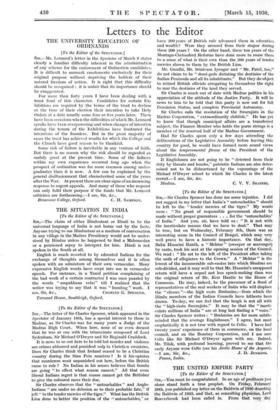[To the Editor of the SPECTATOR.] Snt,—Sir Charles Spencer has
done me some injustice. I did not suggest in my letter that India's " untouchables " should be left to the " tender mercies of the tiger." My words were : " No grant of responsible government should be made without proper guarantees . . . for the 'untouchables' of India." And you, sir, have told us : " It is not with the inarticulate masses that we have to deal." That may be true, but on Wednesday, February 5th; there was an interesting scene in the Council of Bengal, which may very well prove to have a historic importance. On that day, Babu Husseini Ranth, a " Mehtar " (sweeper or scavenger) by caste, took his seat at the opening session of the Council. We read : " He sat to the left of the President after taking the oath of allegiance to the Crown." A " Mehtar " is the lowest of the innumerable sub-castes into which Shudras are sub-divided, and it may well be that Mr. Husseini's unopposed return will have a sequel not less epoch-making than was the original return of Mr. Keir Hardie to the House of Commons. He may, indeed, be the precursor of a flood of representatives of the real workers of India who will displace the " classes "—the high caste Brahmins,—from which• the Hindu members of the Indian Councils have hitherto been drawn. To-day, we can feel that -the laugh is not all with the " high-caste Swarajists." It may be that the " inarti- culate millions of India" are at long last finding a " voice." Sir Charles Spencer writes : " Brahmins are far more subtle- minded that the average Englishman." I agree, but most emphatically it is not true with regard to Celts. I have bad twenty years' experience of them in commerce, on the local council, and on the Bombay Corporation, and I am sure Celts like Sir Michael O'Dwyer agree with me. Indeed, Mr. Tilak, with profound learning, proved to me that the early Aryans were Celts (see his Arctic •Home of the Aryans).




















































 Previous page
Previous page